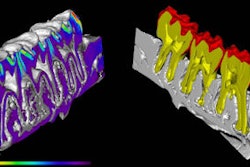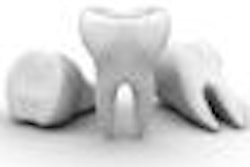Dutch researcher Agnes Berendsen of the Academic Centre for Dentistry Amsterdam has developed a 3D in vitro model that shows promise for aiding in the regeneration of periodontal ligaments and restoring tendons and ligaments elsewhere in the body.
The periodontal ligament forms a flexible connection between the tooth root and the surrounding jaw bone. Trauma or inflammation can cause destruction of the periodontal ligament. Berendsen chose tissue engineering to tackle this problem. In her 3D model, cells isolated from periodontal ligament were implanted in a collagen network suspended between an artificial root and artificial bone. She wanted to see if viable periodontal ligament could be generated in this way.
Berendsen was able to attach the network to the artificial root and bone surfaces by creating an enzyme-mediated mineral deposition on the surfaces. By subsequently applying loading to the tooth root (mimicking the process of chewing) in the 3D model, she was able to deform the mineral-anchored network containing the cells. The subsequent response of the cells was dependent on the magnitude of the loading.
Follow-up research will investigate whether the cell-culture results can be translated to an animal model to obtain more accurate insights concerning the potential use of this method in humans.



















